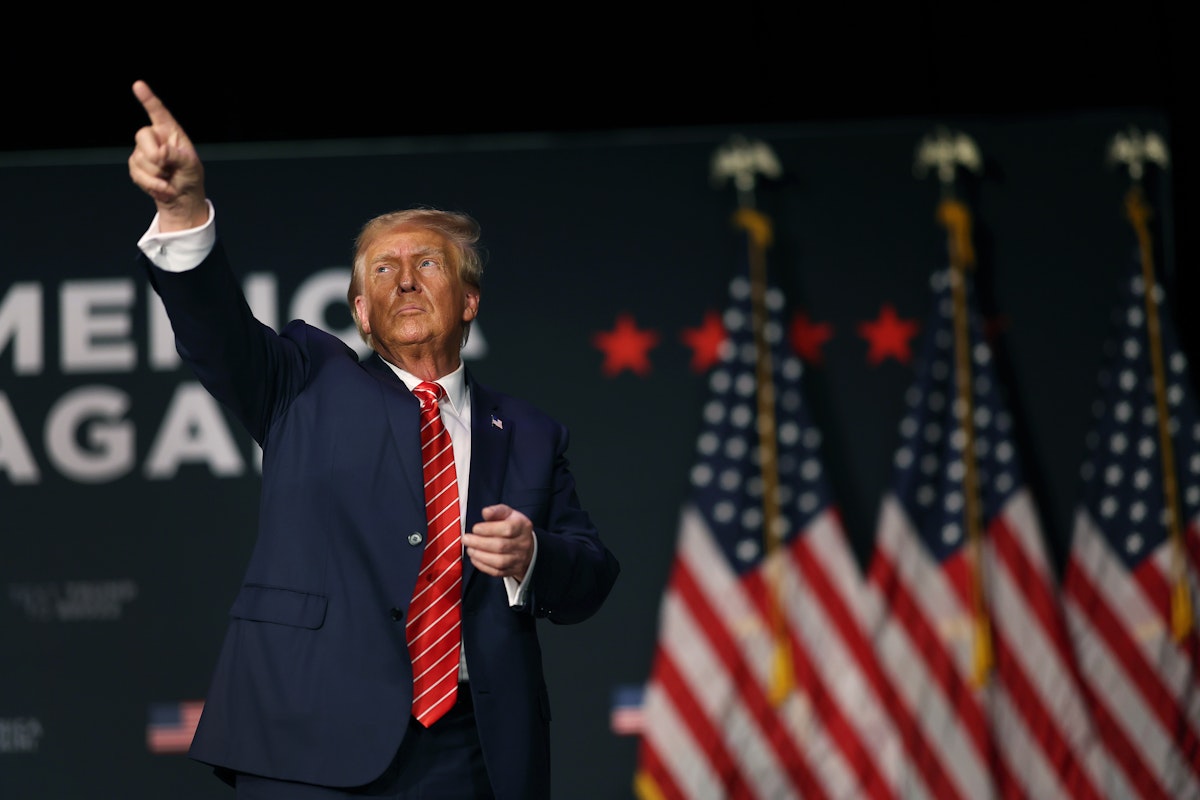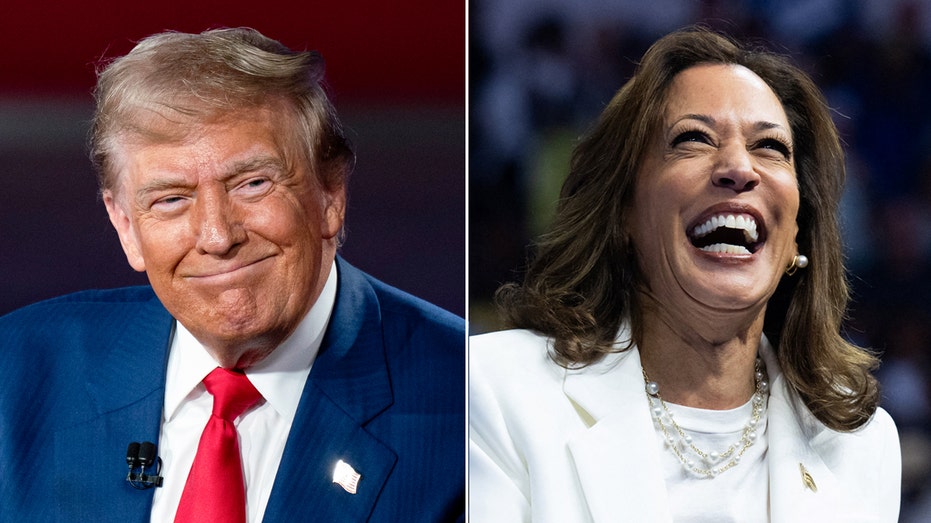Trump Is Assembling His Second-Term Legal Wrecking Crew
It’s possible that former President Donald Trump will retake the White House in 2024. While Americans have yet to cast a single ballot in the primaries, no GOP rival has come close to dislodging him. Legal efforts to declare him ineligible under the Fourteenth Amendment may fall short. And President Joe Biden’s grim poll numbers could damage his re-election chances.Trump has already promised that his second term will be different than his first. And by “different,” he does not mean “better.” A re-elected Trump would be truly unaccountable because there won’t be as many consequences for misrule—the Twenty-Second Amendment would bar his re-election for a third term. (Trump appears to regret this: he once told Xi Jinping than being president-for-life sounds “great.”) Among Trump’s second-term proposals are the destruction of NATO’s principle of collective defense, the purging the civil service, and the weaponization of the Justice Department against his political rivals.The last two things on that list aren’t possible without lawyers. As I recently noted about Ron DeSantis, a president’s personnel choices are perhaps the most important decisions that he makes in office, save for Supreme Court nominations or military actions. An army of underlings end up making countless minor decisions that a president just doesn’t have time for, and they’re constantly at work trying to further the policy agenda they think he holds. In Trump’s case, it’s not just about who he’ll bring to Washington—it’s also about who is willing to destroy their careers and reputations to serve him along the way.Trump has a complicated relationship with lawyers, to say the least. His campaign and associated super PACs have spent tens of millions of dollars on legal fees in the four ongoing criminal cases against him. He has alienated many of his retainers throughout his career by being a notoriously bad client. (Not just “bad” in the moral or legal sense, but “bad” in the sense that he is notoriously resistant to legal counsel and almost as bad at actually paying for these services when they are rendered.)That’s why more reasonable establishment figures like John Dowd and Ty Cobb, who led his defense against the Russia investigation, are long gone. His longtime legal fixer Michael Cohen turned state’s witness against Trump a few years ago, implicating him in campaign-finance offenses and various fraud-related schemes that now imperil the Trump Organization. Rudy Giuliani, the next closest thing he has to a consigliere, is facing disbarment and prosecution.There are other legal advisors who have similarly immolated their careers on his behalf. Sidney Powell, who threatened to “unleash the kraken” after Trump lost in 2020, pleaded guilty last month in exchange for cooperating with Fulton County District Attorney Fani Willis in Trump’s ongoing case there. So did Jenna Ellis and Kenneth Chesebro. Others may soon follow.But if there is one constant of Trumpism, it’s that there are always new right-wing lawyers who are eager to fill the gap. The New York Times, writing this week about a rift between Trump and the Federalist Society, shed some light on the legal minds that Trump might turn to in a second term. Foremost among them is Jeffrey Clark, who tried to engineer his own rise as acting attorney general after the 2020 election when other Justice Department personnel refused to endorse Trump’s election myths. (He, too, is facing racketeering charges in Georgia but hasn’t yet flipped on Trump.)As the Times noted, Clark wrote an essay in May that was simply titled “The U.S. Justice Department is Not Independent.” For ethical and political reasons, most attorneys general since the Watergate crisis have tried to insulate the department’s prosecutorial decisions from the White House to avoid abuses of power or allegations of corruption. Clark argues, in what alternates between personal partisan grievances and constitutional analysis, that this state of affairs must end.“Either the Constitution is properly amended to make DOJ independent or it is improperly amended through an attempt at legislation like that proposed in the wake of Watergate and then subsequently blessed by the Supreme Court,” he incoherently argued. “Under the constitutional system as it stands, however, DOJ independence does not exist and influencers on the Left of all stripes (as well as those on the Center-Right like Professor [Jack] Goldsmith) should stop claiming that it does. They are misleading the people.”It is a fascinating project by Clark and others in Trump’s orbit. On one hand, they try to argue that the Justice Department should be subject to the president’s whims as a normative matter. In the same breath, they also claim that Biden’s supposed targeting of Trump and his allies for prosecution is corrupt and unacceptable. “No Attorney General should allow himself to be used as a tool to persecute the President’s political enemies,” Clark wrote without a hint of irony. “An

It’s possible that former President Donald Trump will retake the White House in 2024. While Americans have yet to cast a single ballot in the primaries, no GOP rival has come close to dislodging him. Legal efforts to declare him ineligible under the Fourteenth Amendment may fall short. And President Joe Biden’s grim poll numbers could damage his re-election chances.
Trump has already promised that his second term will be different than his first. And by “different,” he does not mean “better.” A re-elected Trump would be truly unaccountable because there won’t be as many consequences for misrule—the Twenty-Second Amendment would bar his re-election for a third term. (Trump appears to regret this: he once told Xi Jinping than being president-for-life sounds “great.”) Among Trump’s second-term proposals are the destruction of NATO’s principle of collective defense, the purging the civil service, and the weaponization of the Justice Department against his political rivals.
The last two things on that list aren’t possible without lawyers. As I recently noted about Ron DeSantis, a president’s personnel choices are perhaps the most important decisions that he makes in office, save for Supreme Court nominations or military actions. An army of underlings end up making countless minor decisions that a president just doesn’t have time for, and they’re constantly at work trying to further the policy agenda they think he holds. In Trump’s case, it’s not just about who he’ll bring to Washington—it’s also about who is willing to destroy their careers and reputations to serve him along the way.
Trump has a complicated relationship with lawyers, to say the least. His campaign and associated super PACs have spent tens of millions of dollars on legal fees in the four ongoing criminal cases against him. He has alienated many of his retainers throughout his career by being a notoriously bad client. (Not just “bad” in the moral or legal sense, but “bad” in the sense that he is notoriously resistant to legal counsel and almost as bad at actually paying for these services when they are rendered.)
That’s why more reasonable establishment figures like John Dowd and Ty Cobb, who led his defense against the Russia investigation, are long gone. His longtime legal fixer Michael Cohen turned state’s witness against Trump a few years ago, implicating him in campaign-finance offenses and various fraud-related schemes that now imperil the Trump Organization. Rudy Giuliani, the next closest thing he has to a consigliere, is facing disbarment and prosecution.
There are other legal advisors who have similarly immolated their careers on his behalf. Sidney Powell, who threatened to “unleash the kraken” after Trump lost in 2020, pleaded guilty last month in exchange for cooperating with Fulton County District Attorney Fani Willis in Trump’s ongoing case there. So did Jenna Ellis and Kenneth Chesebro. Others may soon follow.
But if there is one constant of Trumpism, it’s that there are always new right-wing lawyers who are eager to fill the gap. The New York Times, writing this week about a rift between Trump and the Federalist Society, shed some light on the legal minds that Trump might turn to in a second term. Foremost among them is Jeffrey Clark, who tried to engineer his own rise as acting attorney general after the 2020 election when other Justice Department personnel refused to endorse Trump’s election myths. (He, too, is facing racketeering charges in Georgia but hasn’t yet flipped on Trump.)
As the Times noted, Clark wrote an essay in May that was simply titled “The U.S. Justice Department is Not Independent.” For ethical and political reasons, most attorneys general since the Watergate crisis have tried to insulate the department’s prosecutorial decisions from the White House to avoid abuses of power or allegations of corruption. Clark argues, in what alternates between personal partisan grievances and constitutional analysis, that this state of affairs must end.
“Either the Constitution is properly amended to make DOJ independent or it is improperly amended through an attempt at legislation like that proposed in the wake of Watergate and then subsequently blessed by the Supreme Court,” he incoherently argued. “Under the constitutional system as it stands, however, DOJ independence does not exist and influencers on the Left of all stripes (as well as those on the Center-Right like Professor [Jack] Goldsmith) should stop claiming that it does. They are misleading the people.”
It is a fascinating project by Clark and others in Trump’s orbit. On one hand, they try to argue that the Justice Department should be subject to the president’s whims as a normative matter. In the same breath, they also claim that Biden’s supposed targeting of Trump and his allies for prosecution is corrupt and unacceptable. “No Attorney General should allow himself to be used as a tool to persecute the President’s political enemies,” Clark wrote without a hint of irony. “And no President should order his Attorney General to do so.”
That view is not shared by everyone around Trump, to say the least. One of the Times’ other quoted sources is Mike Davis, a former congressional aide and former clerk for Justice Neil Gorsuch. Davis is listed in IRS filings as the head of the Article III Project, which purports to back conservative judges and oppose liberal ones, as well as other groups that claim to be involved in fights against Big Tech and purported censorship. He is most recently credited with launching a failed smear campaign against Justice Ketanji Brown Jackson during her Supreme Court confirmation hearings.
Davis’ Twitter feed, which is an unfiltered glimpse into his worldview, grew steadily more radicalized during the COVID-19 pandemic. Women of color who serve in government positions tend to draw most of his ire, ranging from D.C. Mayor Muriel Bowser to Representatives Rashida Tlaib and Ilhan Omar. “What are the third-world pigs in the Hamas Caucus up to today?” he wrote on October 21, in an apparent reference to certain Democratic members of Congress.
On September 17, he shared a post about a carjacking in Washington, D.C., that he blamed on the Black Lives Matter movement. “We must resume the mass-incarceration [sic] of the violent Black underclass,” Davis wrote. Later that month, he retweeted a post by Richard Hanania that claimed the “most likely explanation for New York Representative Jamaal Bowman pulling the fire alarm” is “low IQ and low impulse control,” which he described as “the same explanation of the actions of most Washington DC [sic] criminals.” Hanania’s history as an pseudonymous author for white-supermacist sites had become public knowledge in August.
One of Davis’s favorite schticks is claiming he would abuse his power in a future Trump administration. “Please remove your cats and pronouns from your Twitter profiles,” he wrote on Twitter in March. “Because when I’m Trump’s next attorney general, I’m adding you to the domestic-terrorism watchlist.” He frequently suggests he would be a future acting attorney general. “My partisanship and vindictiveness will even make Biden and Garland blush,” he wrote last month. “Right before I indict them.”
In one memorable post over the summer, Davis posted a screenshot of the Biden family. “During my 3-week reign of terror as Trump’s acting attorney general, the only Biden I’ll spare from my political lawfare is the 5-year-old granddaughter Joe and Jill refused to acknowledge for years,” he wrote above it. “The rest of these corrupt scumbags called the Biden family will face my wrath.” And in another post riffing on the concept, he added in a would-be letter to Trump himself, “P.S. Don’t forget to sign my presidential pardon.”
It is tempting to dismiss Davis as someone without influence in Washington. Indeed, the Article III Project has shown no significant donations or expenses in its most recent IRS filings, and his political activities do not currently appear to extend beyond writing tweets and giving quotes to journalists. But Davis appears to have caught the attention of at least one influential person: former President Donald Trump, who occasionally posts Davis’ invariably pro-Trump legal claims on his Truth Social page.
Trump’s war on the federal government would go well beyond the Justice Department if he retakes the White House. Another focus of his grievances is the federal bureaucracy writ large, which Trump and his allies blame for his various policy failures during his first term. In October 2020, he sought to orchestrate the mass firings of civil servants through a mechanism known as Schedule F, but it never went into force as the administration’s attention turned to other matters ahead of the election. Now he and his allies want to revive it.
Trump, like all presidents, has the power to replace the people at the upper echelons of the executive branch—cabinet members, agency heads, their top advisors, and so on. Those personnel are subject to Senate approval just like any other high-level appointment. But Trump, with his eye on the purported “deep state,” wants to go much deeper and purge civil servants who are otherwise protected from dismissal by federal law.
To that end, various MAGA groups have reportedly built a shadow government of sorts to plan exactly who would take over which agency should Trump win next year. This goes beyond the usual transition planning that every president-elect does from November to January. The goal is to create a more ideologically submissive civil service that will carry out whatever Trump orders, even if those orders are legally dubious.
Among those drafted into the project is Russ Vought, a former Office of Management and Budget director under Trump, and close Trump ally Stephen Miller, who currently heads an anti-diversity legal group. Michael Rigas, who currently works at the America First Policy Institute, is also part of the team. While serving at the White House’s Office of Personnel Management in Trump’s first term, Rigas reportedly told others that he didn’t think the Pendleton Act of 1883, which set up the merit-based appointment system for federal jobs, was constitutional. (Neither Miller nor Rigas are lawyers.)
This is, essentially, the platform on which Trump is running for election. This is not to say that the former president doesn’t personally have stances on such matters as reproductive rights, on immigration, on foreign policy, or other vital issues—he obviously does. But he’s running for president in large part to immunize himself from his ongoing legal problems, and also to turn the federal government against those who he thinks have wronged him. In this quest, Trump has no shortage of people who would try to help him do it—and who would likely meet the same fate as their countless predecessors.



